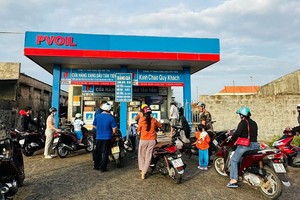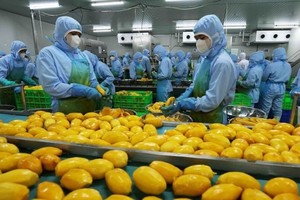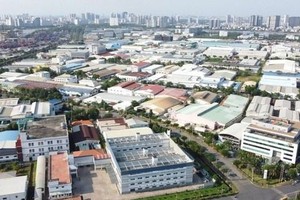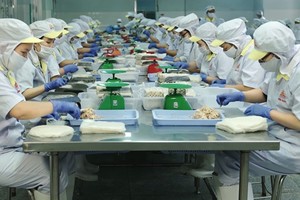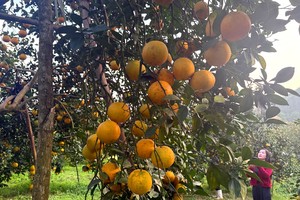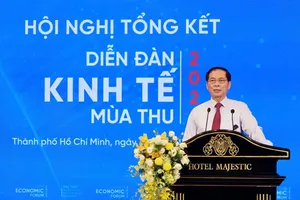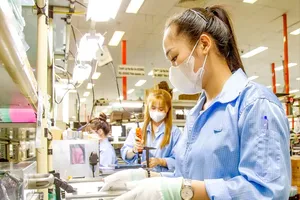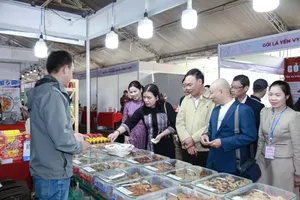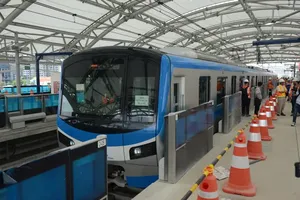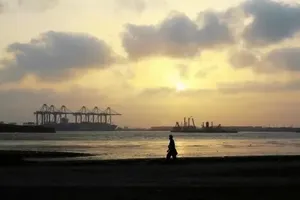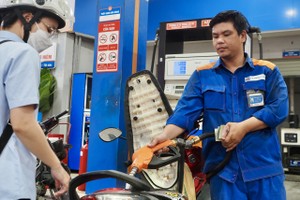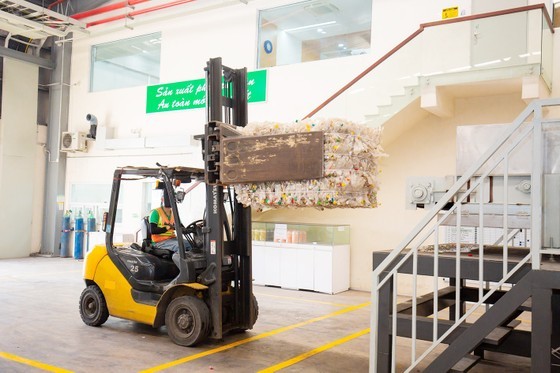 |
Recycling of waste at Duy Tan Company |
Recycling helps to reduce waste and the pollution caused by the extraction and processing of virgin materials and converts waste materials into new materials and objects.
Mr. Ho Kien Trung, Deputy Director of the Department of Environmental Pollution Control under the Ministry of Natural Resources and Environment, said that currently, importers want to use recycled materials for some types of clothing and products with a ratio of 30 percent-60 percent recycled materials.
Meanwhile, the production of these recycled materials in Vietnam is still manual, and small-scale, and the quality is not guaranteed. Therefore, to meet export requirements, Vietnamese garment businesses are required to import recycled, environmentally friendly materials from China.
Regarding the question of why the recycling industry has not been able to develop, Mr. Ho Kien Trung explained that because the technology and technical infrastructure of the recycling industry have not been met; subsequently, it has not yet diversified and fully utilized waste sources as recycled materials such as waste from bamboo and coconut shells to serve the garment industry that manufacturing industries need. Moreover, the government has not had preferential policies for the promotion and support of recycling activities.
Worse, in many places, local authorities do not pay attention to the classification and recycling of waste. Many localities still believe that waste should be burned or buried, so they only invest in incinerators, consequently, waste - valuable resources – is burnt thoroughly or it is burning opportunities to increase recycling rates for commodity products of Vietnam when exporting and burning the carbon quota that the country should have received from recycling and reuse.
Chairman of the Vietnam Waste Recycling Association Tran Viet Anh also said that it is estimated that Vietnam generates about 64,000 tons of household solid waste every day and this number of household solid waste is constantly increasing over the years. Of this, about 85 percent of solid waste is being buried in landfills. This not only puts waste at risk of continuing to pollute the land, water and air ecosystems, but also wastes a large amount of resources, because a lot of waste can be processed into highly economical scrap which can be recycled and remanufactured.
If waste is classified and recycled, many resources will be saved, contributing to reducing environmental pollution. However, Vietnam has not taken heed of this and it has not been implemented because the recycling and reuse industry is not yet developed and there has been no comprehensive management of recycling for different industries.
Mr. Ho Kien Trung added that although the recycling industry is still facing many difficulties, Vietnam also has favorable opportunities for the recycling industry to develop. Specifically, at the United Nations Climate Change Summit (COP26), Vietnam made commitments to respond to climate change, including the reduction of its carbon emissions to zero by 2050 at the latest.
Therefore, in the coming time, all economic activities will aim to reduce pollution, increase recycling, and reduce carbon emissions. In particular, goods that want to be exported to countries must ensure carbon credits and demonstrate the process of minimizing carbon emissions.
In addition, the Ministry of Natural Resources and Environment has also introduced regulations on extended manufacturer and importer responsibility (EPR) to contribute financially to waste collection, recycling and treatment facilities. In particular, one of the important policies to promote the development of the recycling industry is the form of carbon credit trading that has been included in the 2020 Environmental Protection Law.
Accordingly, companies that are collecting, processing, and recycling waste will have more opportunities and profits from providing carbon credits to businesses that have not yet met their carbon quotas. Far more than that, many policies to support and promote the development of the recycling industry such as preferential policies, investment capital support and tax preferences have also been issued.
According to Mr. Nguyen Quoc Trung, founder of the Center for Environmental Protection and Climate Change Response, in the context that climate change is getting worse and human activities have been the main driver of climate change, primarily due to the burning of fossil fuels like coal, oil and gas; thus, reducing greenhouse gas emissions and aiming for net zero has become a world-leading goal. This has created more opportunities for businesses to participate in the carbon reduction roadmap.
Nevertheless, to be able to deeply participate in this roadmap, businesses need to pay more attention to recycling and reuse of waste and companies’ activities should be oriented toward the development of products from recycled materials. Promotion of recycling and reuse of waste not only helps save costs and increase business competitiveness but also creates new business opportunities in environmentally friendly fields, products and services.
Being an expert, Associate Professor Phung Chi Sy from the Vietnam Association for the Protection of Nature and Environment, also said that promoting recycling and reuse of waste is an inevitable trend towards the circular economy. The transition to a circular economy is a great opportunity for rapid, sustainable development. At the same time, the country’s economic development is designed according to the circular economy model in which products and materials are designed in such a way that they can be reused, remanufactured, recycled or recovered also contributes to raising people's awareness about reusing and recycling waste.
According to Associate Professor Phung Chi Sy, in order to promote the recycling industry, authorities need to synchronously implement solutions such as promoting waste classification in households as well as have policies to promote the market for recycled products and call for investment in the development of industries that support recycling activities.
According to the Department of Natural Resources and Environment of Ho Chi Minh City, the total volume of domestic solid waste generated in the city is about 9,500 - 10,000 tons per day. Of which, the rate of composting and recycling accounts for 31 percent, and the rest is hygienically landfilled. The city has set aside two solid waste treatment complexes including Da Phuoc in Binh Chanh suburban district with an area of 614 hectares and Phuoc Hiep in Cu Chi outlying district with an area of 687 hectares for the treatment of domestic waste.
In the long term, landfill activities will put great pressure on the city's general land fund. Therefore, to reduce pressure on waste treatment, the city is also implementing solutions such as classifying waste in households in addition to a proposal to build waste recycling centers for the development of the recycling industry with an orientation towards a circular economy.

